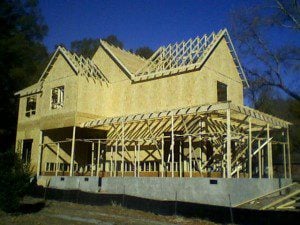This past Saturday, the alleluias of Easter still resounding in our ears, we got up early for a work day at Rutba House. These things do not happen without some prep work. Two years ago, we noticed that the house next door to ours on Onslow Street was falling down. The hole in the roof had gone unattended for months. We wondered how Marie, our neighbor, continued to live there. Then, one day, she was gone.
We walked through the house with a friend who’s a contractor, looking for what could be salvaged. The foundation was bad. The wood was rotting. The roof was about to cave in. I stopped midway through the tour to take the kids outside, worried that the mold might settle in their little lungs.
A few weeks later the bulldozer came. The house was gone in thirty minutes, but it took the rest of the day to load the debris onto dump trucks and haul it across town to be buried in the ground. Beside us sat an empty lot.
We’d been talking for years with the housing development group in our neighborhood about rising home prices, about the dangers of gentrification. They’re good people. They had rehabbed dozens of homes for neighbors who’d rented all their lives. A grandmother who raised her kids in the projects, feeding them with money she earned cleaning other people’s houses, got a nice three bedroom to call her own from them. Now she gets up early every Saturday morning to cut the grass, running an edger along the sidewalk to cut a crisp, clean line. She’s proud of what she has, and she works hard to keep it nice. Community is made by people like her.
But markets being what they are, there comes a point when too much development can change a neighborhood. This is what we’d been talking with the housing group about. As long as renters were becoming home owners, their model worked. But when we ran out of neighbors who could make that transition, grad students started qualifying as “low income” families, buying starter homes to write their thesis in. They didn’t bother getting to know their neighbors names because they were, for the most part, afraid of them. Every three years, more or less, they moved on… often with a loud, late-night party to celebrate their departure. No one was sad to see them go.
All of this was part of our conversation with the developers about the lot next door. Eventually, they decided not to build another house. Maybe we convinced them. Or maybe property values just rose to a point that their model doesn’t work here anymore. At any rate, they sold us the lot to keep as a green space. We started to dream what it might become.

Sarah, who doesn’t lack for vision, sketched a three tiered garden with a prayer labyrinth at its heart—a place to pray and grow fresh vegetables. My brother, who runs a landscaping company, volunteered to do the grading. Dan ordered supplies and thought through what it would take to build the walls, to spread the dirt. We talked the vision up to the neighbors and to our friends, proclaiming the good news of a garden in the city. Still, we all felt like Ezekiel must have, looking over that valley of dry bones. All we could see when we looked out the window was a mud pit.
But we each had our jobs to do. Leah made plans for the kids to go off with a friend for the day. Matt got all the tools out. I checked in with neighbors who I knew had the time and asked to make sure they were coming. “Work day tomorrow,” I said half a dozen times. “We’ll have coffee and donuts in the morning, lunch for anybody who makes it that long.”
This prep work done, we showed up Saturday morning, twenty of us scurrying about the mud pit finding our tasks. I worked with my shovel on the ditch I was assigned to, chatting with Alex about the rock climbing he likes to do on the weekends and the rabbits he raises in his back yard. A chain saw whined on the hill above us, then two other guys delivered a landscaping timber that fit our ditch just so. We smiled, a little surprised that it worked on the first try. “Not bad for a couple of amateurs.”
By late morning the sun was up. I was sweating, and I could feel my back begin to ache. I don’t do this kind of work often enough. I looked at my watch. I looked around. I had a conversation with Leah about lunch plans.
When the food arrived from a local sandwich shop, I called “break” because it was after noon, because I needed it. Sarah grumbled. “Break if you need to. We’re not done yet.” Each person was left to discern the mixed messages, to decide for themselves when to grab a bite. Sitting in the shade at the bottom of the hill, holding a sandwich in my hands, I looked up and was amazed.

A garden was taking shape, here in the place where a dilapidated house once stood, here in the mud pit that we’d been trampling all morning. It wasn’t finished yet, but I could see it now. Though there’s nothing we could do to make it happen, green shoots were going to rise out of this soil. A resurrection was happening. In lieu of grace, I whispered alleluia.
I tell you all of this because I’m excited about the garden–because I wanted an excuse to share this picture. But it also occurs to me, as I think about this garden and how it’s come to be, that it’s like everything we do here. A garden grows like a community. It takes a lot of work, everyone doing their part. In the midst of it all, it can wear you out. But even when all the work is done–even when we’ve spent our last energy–there’s nothing you can do, really, to make it grow. There’s nothing you can do to make a person change, to give a person hope, to guarantee that someone will wake up to God’s love, saved.
We sow seeds, as the apostle said. We water if we can get a hose, and we pray for rain when we can’t. But it’s always God who gives the increase. Every veggie, every life, is its own miracle.
When we’re paying attention, every breath can be an alleluia.











